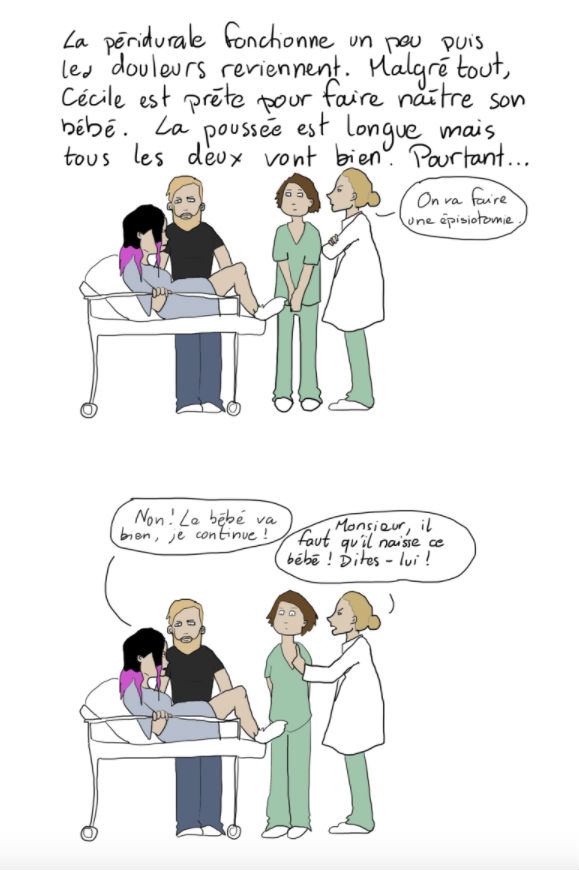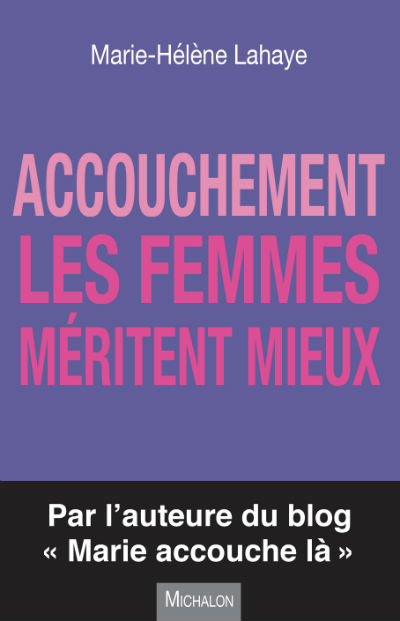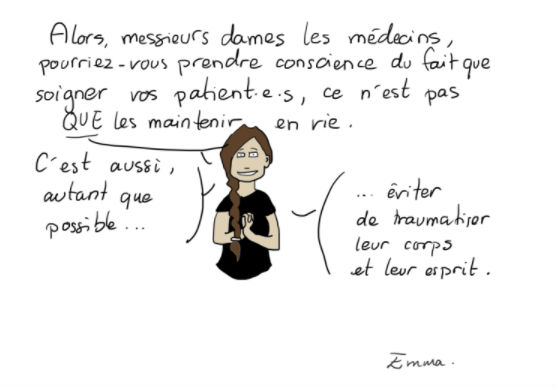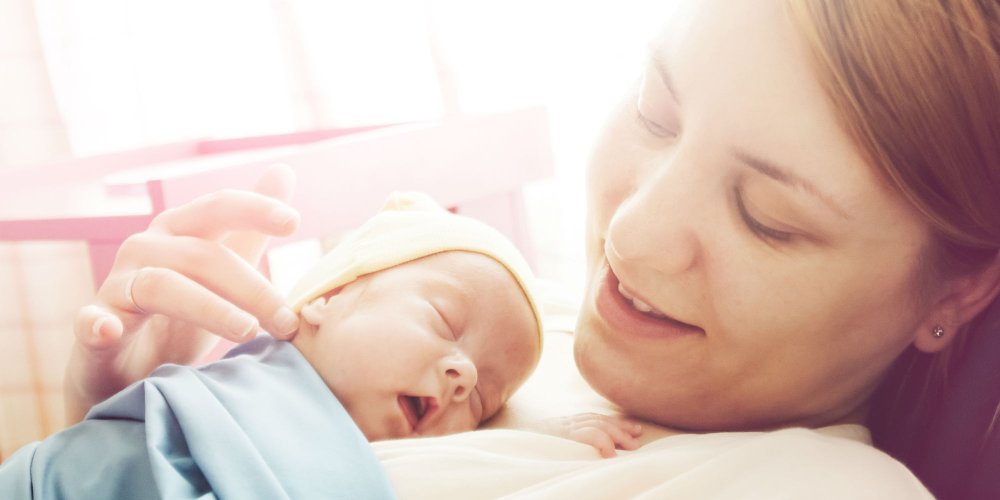"A baby if I want, when I want, and as I want". This is the credo of Marie-Hélène Lahaye. This outspoken Belgian, a lawyer by training, opened her blog in 2013, "Marie gives birth there," to ask about childbirth.
"A year ago, I had the chance to experience a childbirth respected and therefore to discover what are the sensations of putting a child in the world.But for others, this paroxysmal emotional, physical, all these extreme sensations, are disturbed by doctors who tell them 'you must do this, do that, go to bed in this position, do not move.' "Very quickly, I spoke of my delivery to my friends who told me that they did not had not experienced the same thing as me and confirmed this intuition: giving birth can be traumatizing.Through me I decided to open my blog.I received many testimonies of women who, for some, spoke of torture From the first notes there was a lot of sharing. "
Five years later, she published "Childbirth: Women deserve better" (Michalon ed.), A book that takes up most of her thoughts on childbirth, its dysfunctions and the (long) road that still has to be traveled. so that this particular moment is no longer lived in suffering, whether physical or psychological.
What do you think are the dogmas of obstetrics that are problematic today?
"There is one that is fundamental, it is to think that women are not able to put their child into the world themselves.It is the idea that runs through all medicine and society: they necessarily need someone else to help them give birth.
From this comes all this medicalization, this hand put on women, all these injunctions, beliefs that are embedded in their heads: they are fragile, weak, that their body is unsuitable, that they would be potentially dangerous for their baby and risk dying ... Obviously, receiving this message when you become a mother has an impact on its construction as such.
But it's the opposite. What I demonstrate in my book is that we are mammals like any other and that the overwhelming majority of women are able to give birth to their babies alone. If there is support to be provided, it must meet their basic needs: to be benevolent, soothe their pain, support them in the face of these very strong emotions.
It is sometimes seen in press articles that tell a little light unexpected deliveries and whose title is systematically 'Her husband helps give birth' or 'The husband gives birth to his wife'. Even in these moments, where there are no medical figures, one understands that women needed another person, who did everything, while no, it is the mother who has everything. to give birth to her child. If her husband had not been there, she would have given birth anyway. "
What can be the consequences of obstetric or verbal violence during childbirth?
"Women are given a self-depreciated image of themselves when a big part of the problem lies in the way they have been cared for.
Post-traumatic stress disorder is a scientifically validated consequence. It stems from a time when the woman believed that she was going to die, that she experienced childbirth as a torture. Others are affected by postpartum depression . It is interesting to see that in the studies done on the subject, we are interested in what the mother would have as predisposition, what she could have lived in the past, as if the explanation were in her. But we realize, through their testimonies, that there are two factors that come up very often: a childbirth that went wrong and a feeling of loneliness. The idea that this disorder is caused by childbirth and therefore by the acts of doctors is still something that is not admitted.
Studies show that 50 to 80% of young mothers live a baby blues . Again, no scientific explanation. We do not know how to explain it so we put everything on the account of hormones. The phony excuse. Indeed, we find that there is a hormonal variation at that time, but women simply find the hormonal level before their pregnancy. It is almost intrinsic to consider a woman to be depressed after giving birth.
When we see the testimonies of women who have experienced a respected birth, who have been in control of their bodies and have experienced an extraordinary moment, we also see that these women have not made baby blues. "
Episiotomy, epidural, cesarean are they finally "weapons of domination of women" among others?
"It all depends on how they are used, it is not the technique as such that bothers me, but what one does that is to be analyzed.
Take the epidural for example: if a woman asks for it because it hurts and is given it, that's fine, that's why this technique exists. When it's for women and women's interests, there is no problem.
But if it's in the interest of other people, for example in caregivers who say it's better to work in a quiet environment with all those women who smile, are kind and polite, that's a question. Ditto when this technique is used in the interest of the hospital to manage the flow of women giving birth and optimize the rotation in the delivery rooms while maintaining a certain pace. Here again, I wonder: where is the interest of women?
Sometimes it happens that it is even the husband who makes the request because he can not stand the show he is attending and in which he is quite passive! He does not like to see her screaming, but it's not necessarily pain. We also shout in the roller coaster! It is something that is indeed very impressive and the husband, because he is not psychologically prepared, pushes her to take the epidural to relieve himself.
It's the same for the episiotomy . When the child is in a state of fetal distress, it can be used to speed up the birth and that's fine. But to do a routine episiotomy to avoid tearing the perineum , we must not do it anymore. "
 emmaclit.com
emmaclit.com
How to explain that some maternities practice very little episiotomy when others tend to systematize it?
"Maternity facilities like those in Nanterre and Besançon stick to the recommendations of the French National College of Gynecologists and Obstetricians (CNGOF), they rely on the scientific literature and show that all the benefits expected from episiotomy such as it was practiced throughout the twentieth were not demonstrated. They do not prevent perineal tears or even aggravates and complicates the healing process. it has negative side effects on women, does not prevent incontinence , the descent of organs ... It should be used only in case of serious threats to the health of the child, and it is a rare situation.
The overwhelming majority of medical procedures are useless and even contrary to the proper process of childbirth. But women are scared to be forced on them, probably because caregivers are afraid of many things themselves.
The law provides clearly stipulates that it takes the free and informed consent of the woman for every medical procedure practiced, so it means without constraints. Free and informed consent implies a free and informed refusal, but when a woman says no to an act, the caregivers have no other alternatives because they are in a certain logic and facing a woman who refuses, they are completely deprived. And so they override his consent or scare him. Which is illegal. "
Have we finally fallen into a "standardization of childbirth"?
"Totally, when we see the latest figures from INSERM, we realize that 82% of women have resorted to an epidural, while in other countries we are around 15 or 20%.
Only because the norm is to give birth on the back, with an epidural and a cervical opening of 1cm per hour. Everyone has this image of the woman giving birth on her back, who screams with everyone around her. One has the impression that there is only this vision. It is a vision very different from what a woman actually experiences when she gives birth.
Attention, I'm not against medicalization, and I do not advocate natural childbirth at all costs. It is obvious that women who need medical assistance, about 10%, must use it. Those who want an epidural because they have too much pain should be able to use it too. But to impose that on all women without distinction is shocking in the current system. It's a very old vision and the last stronghold of pressure on women. "

In your book, you criticize the "position of the missionary" during childbirth ...
"The woman should be able to move, it's an aberration on her back and it's very uncomfortable, imagine, you have all that weight on your belly that crushes the organs, prevents good blood circulation and breathe properly!" Spontaneously you want to sit or lie down on your side, at the time of delivery you put them in the worst position that you have, so we compensate for that with an epidural, and just when you come to them with an epidural and she must sit, many of them say they feel much better.
There is something delusional and again we do not think about the comfort of the woman but that of the doctor. He is in a position where he dominates the woman, he is dressed, she is undressed before him. And any other position that would be more suitable for women would force doctors to stand up to them, on their knees in front of the woman. Which is inconceivable because one would enter a mechanism of opposite domination. "
Should we finally give priority to birthing centers or home births to "give birth better"?
"The care is necessarily different in this kind of place and there is a philosophy of childbirth respected.Everything is turned to the basic needs of women.While those who give birth at home are 'home' so they feel safe, they are not in an unfamiliar place, and therefore mistress of what is happening The midwife is a 'guest' so there is a different relationship between patient and caregiver.
These are places that should be encouraged, in any case do not constrain as is currently the case. The state is against and leads an anti-childbirth policy at home by depriving wise women of insurance for example. And we do not want birthing centers because they are disconnected from hospitals.
The important thing is that women have the choice to give birth in the place they want. Whether it's a hospital, a birth house or their home. We must rethink the way we give birth at the hospital and learn from pilot maternities like Nanterre, who are thinking about better support. Finally, for those who need medicalization, there is no reason that they are abused. We can make things more enjoyable. "
 emmaclit.com
emmaclit.com




